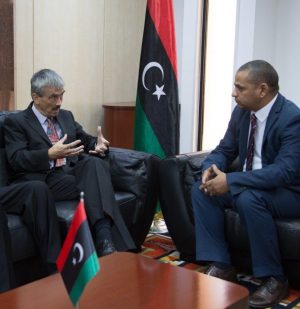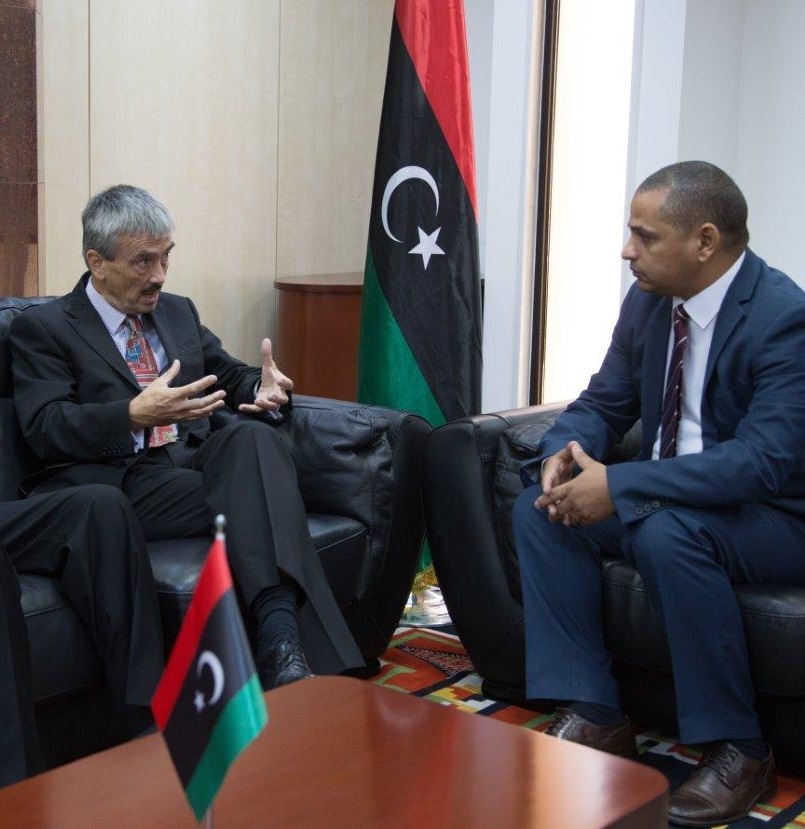By Sami Zaptia.

London, 21 September 2016:
Libya Herald has been granted an exclusive written question and answer interview with the newly appointed Chairman of the Interim Steering Committee of the Libyan Investment Authority (LIA), Ali Mahmoud Hassan Mohamed.
Mohamed was appointed Interim Chairman by the Faiez Serraj-led Presidency Council/Government of National Accord (PC/GNA) by virtue of its decree number 115 of 2016 to head an Interim Committee of five on 15 August.
The move by the PC/GNA come on the back of the sudden resignation of Hassan Bouhadi as eastern-designated chairman of the LIA on 13 August after he was placed under house arrest in Benghazi and forced into holding a board meeting at which Ali Shamekh was appointed as LIA Chief Executive Officer.
Bouhadi’s resignation was promptly followed by the resignation of eastern Central Bank of Libya governor Ali Hibri on 15 August as a member of the LIA’s board of trustees in protest at the way that Bouhadi was treated and the LIA was being run by the eastern authorities.
It will be recalled that the chairmanship of the LIA was being contested at the London High Court and that the LIA is still contesting cases in London with Goldman Sachs and Soc Gen.
According to information and a biography obtained by Libya Herald, Ali Mohamed is from Libya’s central region of Waddan. He was previously a member of the LIA’s Board of Directors and its Governance Committee, and had previously headed its Audit and Review Department. He is also a current Board Member of the Libyan Local Investment and Development Fund (LLIDF), a subsidiary of the LIA.
He previously acted as Head of the Credit Risk Department and General Manager of the Libyan Company for Financing and Leasing, Assistant Head of the Department of Banking and Finance of the Libyan Academy, Head of the Ph.D. Programme of the Libyan Academy, and Dean of the Faculty of Business Administration – Wadan at the University of Sirte.
Ali Mohamed obtained his Bachelor’s in Administration from the University of Tripoli, his Master’s in Financial Planning from the College of Higher Education for Planning in Tripoli, and his Ph.D. in Financial Management from the Arab Academy for Banking and Financial Services in Jordan.
Libya Herald: Our international readers are keen to know more about you. Can you give us your full name, which Libyan tribe, town or city you are from? Can you tell us about your education, management or business background etc?
Ali Mohamed: ‘’I am very proud to be born and bred in Libya and to have completed my undergraduate and postgraduate training in our country. I have extensive knowledge of financial management and governance in both academic and operational terms, which is vital at this time as we unite the Libyan Investment Authority and prevent any unlicensed attempts by third parties to exert control over the assets and governance systems located within Libya and across international markets’’.
‘‘The vast majority of the LIA’s assets are located overseas. Likewise, many of the regulatory systems under which the LIA assets are outside Libya and regulated by international banking and financial codes of best practice and governance – which is good news for Libyans as they can be assured that the rogue actions of a very few who appear to think that asserting their past leadership might outweigh such governance does not make headway in regulated and well controlled markets’’.
‘‘This is important today and having the EU regulation, accountability standards and governance that is offered by the Malta platform for the LIA is vital to our credibility with banks, investment partners and those companies in which the LIA invests’’.
‘‘In Libya, we are working very hard to ensure that the parties that carefully manage the assets out of Malta and those that seek to protect them in Libya from the office in which I am based in Tripoli, are working in a harmonised and accountable manner’’.
‘‘I am pleased to say that day-to-day activity is integrated and there are clear lines of communications and joint activity between the parties based within the two offices that drive the activity of the LIA’’.
LH: With Tobruk appointing an LIA Chief Executive Officer and Abdulmajid Breish still claiming that he is still chairman, there is total confusion about who exactly is running the LIA. Can you assure our readers about this?
Ali Mohamed: ‘‘The Libyan Political Agreement signed in Skhairat on 17 December 2015 has been recognised both locally and internationally as the way forward for Libya. Under the agreement, the House of Representatives remains the legislative body and the Presidential Council was handed all military and civil authorities. The international community reaffirmed UN Resolution 2259 acknowledging the GNA’s exclusive power to govern Libya and to exercise oversight over national institutions including the LIA’’.
‘‘Subsequent to the Libyan Political Agreement, all self-made appointments to the LIA not made by the Presidential Council are not recognised in Libya or abroad’’.
‘‘The Presidential Council of Libya appointed the Interim Steering Committee for the LIA, which I head, to safeguard Libya’s assets and to make sure that the LIA is well represented in international courts especially in the trails of Goldman Sachs and Société Générale S.A’’.
LH: Isn’t it time you allowed the London High Court to rule on who is the legitimate chairman of the LIA?
Ali Mohamed: ‘‘The hearing against Goldman Sachs is completed and we await the judge’s verdict. The next case, addressing the actions of Société Générale S.A, is in process and there are case management meetings just this month’’.
‘‘The former chairman of the LIA, Hassan Bouhadi and his Board of Directors put in place a receiver (a Trustee) to secure these litigations and in so doing the court may proceed unhindered. This is continuing and as the president of the Interim Steering Committee I commend the board of the LIA for their foresight in developing this legal protection for both important cases’’.
‘‘The governance and control of the LIA is clear. There is only one LIA. It is a Libyan institution that has the vast majority of its assets outside Libya and is regulated and governed by international financial processes that are standard across all such financial institutions’’.
‘‘Governance is determined by regulation outside Libya and the committee of which I am President is recognised by the UN, the international community like the UK, USA, Italy, France, Germany all of whom cited in a communique of 17 August 2016 after UNSC Resolution 2259 that the Government of National Accord (GNA) had sole responsibility to exercise effective oversight over Libya’s national institutions, including the LIA’’.
‘‘This was in response to the decree of the President’s Council and its chairman, Mr Serraj, the only national leader from the only leadership body recognised Under the Libyan Political Accord of the need to create an interim steering committee of the LIA with a nominated resident on 15 August 2016. This decree, number 115 of the Presidential Council appointment me as interim president of the steering committee’’.
‘‘Presently, any other individual or group that claim to lead, run or control the LIA are without authority and are not recognised in Libya or as a result of UNSC Resolution 259 out-with the country either’’.
LH: Will this confusion affect the London High Court cases against Goodman Sachs and Societe Generale? What steps can you take to ensure the court cases go smoothly?
Ali Mohamed: ‘‘The proceedings against Goldman Sachs are completed and we await the judge’s verdict. The next case, addressing the actions of Société Générale S.A, is in process and there are case management meetings just this month’’.
‘‘The former chairman of the LIA, Hassan Bouhadi and his Board of Directors put in place a receiver (a Trustee) to secure these litigations and in so doing the court may proceed unhindered’’.
‘‘This is continuing and as the president of the interim steering committee I commend the board of the LIA for their foresight in developing this legal protection for both important cases’’.
LH: Will you be running the LIA from Tripoli or Malta or elsewhere. Will you shut down the Malta office?
Ali Mohamed: ‘‘I am based in Tripoli along with the many of the LIA staff. The Malta office will also be maintained to help oversee the vast majority of the LIA’s assets, which are located overseas. The EU regulation, accountability standards and governance that is offered by the Malta platform for the LIA is vital to our credibility with banks, investment partners and those companies in which the LIA invests’’.
‘‘In Libya, we are working very hard to ensure that the parties that carefully manage the assets out of Malta and those that seek to protect them in Libya from the office in which I am based in Tripoli, are working in a harmonised and accountable manner’’.
‘‘I am pleased to say that day-to-day activity is integrated and there are clear lines of communications and joint activity between the parties based within the two offices that drive the activity of the LIA’’, concluded the LIA Interim Chairman.












